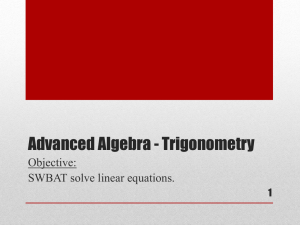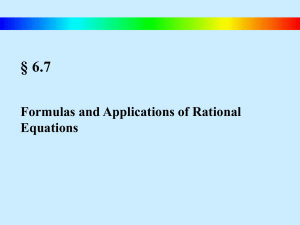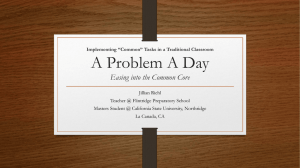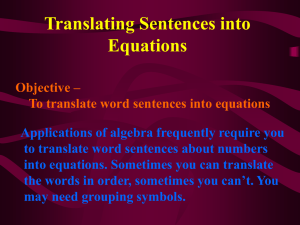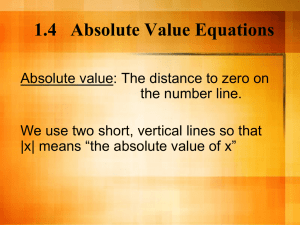3.2
advertisement
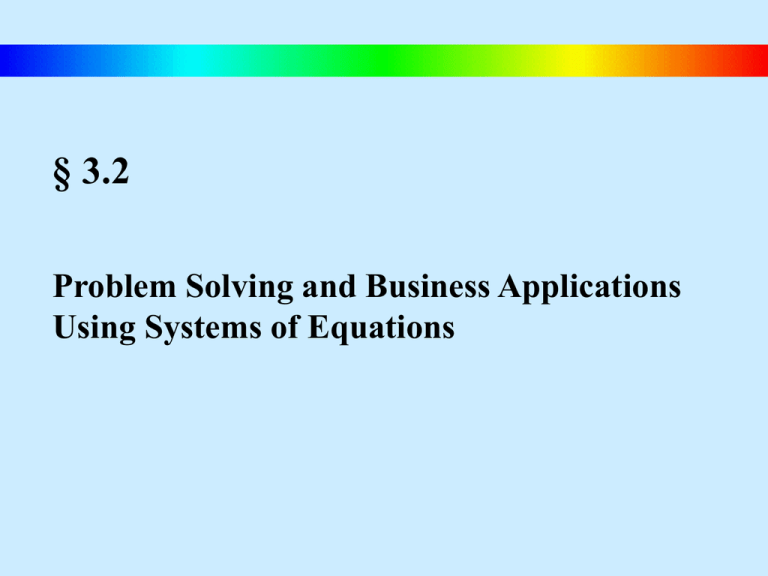
§ 3.2 Problem Solving and Business Applications Using Systems of Equations Systems of Equations in Application A Strategy for Solving Word Problems 1) Use variables to represent unknown quantities. 2) Write a system of equations describing the problem’s conditions (translate from English to Math Language). 3) Solve the system and answer the problem’s question (make sure you answer the question being asked, not some other question!). 4) Check the proposed solution in the original wording of the problem. Blitzer, Intermediate Algebra, 4e – Slide #30 Systems of Equations in Application EXAMPLE You invested $7000 in two accounts paying 6% and 8% annual interest, respectively. If the total interest earned for the year was $520, how much ws invested at each rate? SOLUTION 1) Use variables to represent unknown quantities. Let x = the amount invested at 6%. Let y = the amount invested at 8%. Blitzer, Intermediate Algebra, 4e – Slide #31 Systems of Equations in Application CONTINUED 2) Write a system of equations describing the problem’s conditions. x + y = 7000 This tells us the sum of the money invested is $7000. Also, we’re concerned with how much money was invested into each of the accounts. We can use a table to organize the information in the problem and obtain a second equation. Principal (Amount Invested) Interest Rate Interest Earned 6% Investment x 0.06 0.06x 8% Investment y 0.08 0.08y Blitzer, Intermediate Algebra, 4e – Slide #32 Systems of Equations in Application CONTINUED The amount of interest from each account is: 0.06x and 0.08y. And since we are concerned with both amounts of interest adding up to $520, the following equation results: 0.06x + 0.08y = 520. 3) Solve the system and answer the problem’s question. The system x + y = 7000 0.06x + 0.08y = 520 Blitzer, Intermediate Algebra, 4e – Slide #33 Systems of Equations in Application CONTINUED can be solved by substitution or addition. Substitution will work well since both variables in the first equation have coefficients of 1. So, we’ll use substitution. First we’ll isolate x in the first equation. x + y = 7000 x = 7000 - y Subtract y from both sides Now substitute 7000 – y for x in the second equation. Blitzer, Intermediate Algebra, 4e – Slide #34 Systems of Equations in Application CONTINUED 0.06x + 0.08y = 520 0.06(7000 - y) + 0.08y = 520 420 – 0.06y + 0.08y = 520 420 + 0.02y = 520 0.02y = 100 y = 5000 Replace x with 7000 - y Distribute Add like terms Subtract 100 from both sides Divide both sides by 0.02 Now substitute 5000 for y in either of the original equations. We’ll use the first. Blitzer, Intermediate Algebra, 4e – Slide #35 Systems of Equations in Application CONTINUED x + y = 7000 x + (5000) = 7000 x = 2000 Replace y with 7000 Subtract 5000 from both sides Therefore, $2000 will be invested into the 6% account and $5000 will be invested in the 8% account. This is the potential solution. Blitzer, Intermediate Algebra, 4e – Slide #36 Systems of Equations in Application CONTINUED 4) Check the proposed answer in the original wording of the problem. Do both investments add up to $7000? x + y = 2000 + 5000 = 7000 true Do the two investments yield a combined $520 in interest? The 6% investment yields, in interest, 0.06x = 0.06(2000) = $120. The 8% investment yields, in interest, 0.08y = 0.08(5000) = $400. And since $120 + $400 = $520, the solution has been verified. Blitzer, Intermediate Algebra, 4e – Slide #37 Systems of Equations in Application EXAMPLE A jeweler needs to mix an alloy with a 16% gold content and an alloy with a 28% gold content to obtain 32 ounces of a new alloy with a 25% gold content. How many ounces of each of the original alloys must be used? SOLUTION 1) Use variables to represent unknown quantities. Let x = the number of ounces of the 16% alloy to be used in the mixture. Let y = the number of ounces of the 28% alloy to be used in the mixture. Blitzer, Intermediate Algebra, 4e – Slide #38 Systems of Equations in Application CONTINUED 2) Write a system of equations describing the problem’s conditions. We need 32 ounces of an alloy containing 25% gold content. We form a table that shows the amount of gold content in each of the three alloys. Number of Ounces Percent of Gold Content Amount of Gold Content 16% Alloy x 16% = 0.16 0.16x 28% Alloy y 28% = 0.28 0.28y 25% Alloy 32 25% = 0.25 32(0.25) = 8 Blitzer, Intermediate Algebra, 4e – Slide #39 Systems of Equations in Application CONTINUED Since adding the two amounts of alloy (x and y) will yield 32 ounces of 25% alloy, x + y = 32. The 32-ounce mixture must have a 25% gold content. The amount of gold content must be 25% of 32 ounces, or (0.25)(32) = 8 ounces. 0.16x + 0.28y = 8 Therefore, the system of equations is x + y = 32 0.16x + 0.28y = 8 Blitzer, Intermediate Algebra, 4e – Slide #40 Systems of Equations in Application CONTINUED NOTE: The first equation summarizes how many total ounces of each of the three alloys. The second equation summarizes how much gold content in each of the three solutions. Each equation summarizes exactly one type of quantity. 3) Solve the system and answer the problem’s question. The system can be solved by substitution or addition. Substitution will work well since both variables in the first equation have coefficients of 1. So, we’ll use substitution. First we’ll isolate y in the first equation. Blitzer, Intermediate Algebra, 4e – Slide #41 Systems of Equations in Application CONTINUED x + y = 32. y = 32 - x Subtract x from both sides Now substitute 32 – x for y in the second equation. 0.16x + 0.28y = 8 0.16x + 0.28(32 - x) = 8 0.16x + 8.96 – 0.28x = 8 8.96 – 0.12x = 8 – 0.12x = -0.96 x=8 Replace y with 32 - x Distribute Add like terms Subtract 8.96 from both sides Divide both sides by -0.12 Blitzer, Intermediate Algebra, 4e – Slide #42 Systems of Equations in Application CONTINUED Now substitute 8 for x in either of the original equations. We’ll use the first. x + y = 32 8 + y = 32 y = 24 Replace x with 8 Subtract 8 from both sides Therefore, the potential solution is (8,24). That is, 8 ounces of the 160% alloy and 24 ounces of the 28% alloy. Blitzer, Intermediate Algebra, 4e – Slide #43 Systems of Equations in Application CONTINUED 4) Check the proposed answer in the original wording of the problem. Do the amounts of the two alloys add up to the desired 32 ounces? x + y = 8 + 24 = 32 true Also, the problem states that we need 32 ounces of a 25% gold content alloy. The amount of gold content in this mixture is (32)(0.25) = 8 ounces of gold content. The amount of gold content in 8 ounces of a 16% solution is (8)(0.16) = 1.28 ounces. The amount of gold content in 24 ounces of a 28% alloy is (24)(0.28) = 6.72 ounces. So, 1.28 + 6.72 = 8 ounces of gold content, exactly as it should be. Blitzer, Intermediate Algebra, 4e – Slide #44 Systems of Equations in Application EXAMPLE A motorboat traveled 36 miles downstream, with the current, in 1.5 hours. The return trip upstream, against the current, covered the same distance, but took 2 hours. Find the boat’s rate in still water and the rate of the current. SOLUTION 1) Use variables to represent unknown quantities. Let x = the rate (speed) of the motorboat. Let y = the rate (speed) of the stream. Blitzer, Intermediate Algebra, 4e – Slide #45 Systems of Equations in Application CONTINUED 2) Write a system of equations describing the problem’s conditions. Rate Time Distance Downstream x+y 1.5 36 Upstream x-y 2 36 Blitzer, Intermediate Algebra, 4e – Slide #46 Systems of Equations in Application CONTINUED Therefore, the system of equations is: (x + y)1.5 = 36 (x - y)2 = 36 3) Solve the system and answer the problem’s question. Upon distributing, the system simplifies to (x + y)1.5 = 36 (x - y)2 = 36 1.5x + 1.5y = 36 2x - 2y = 36 I will now solve the second equation for x. x = 18 + y 2x - 2y = 36 2x = 36 + 2y Second equation Add 2y Blitzer, Intermediate Algebra, 4e – Slide #47 Divide by 2 Systems of Equations in Application CONTINUED In the first equation, replace x with 18 + y. 1.5x + 1.5y = 36 1.5(18 + y) + 1.5y = 36 27 + 1.5y + 1.5y = 36 27 + 3y = 36 3y = 9 y=3 First equation Replace x with 18 + y Distribute Combine like terms Subtract 27 from both sides Divide both sides by 3 Now we can use either equation to find x. Let’s use the second equation. Blitzer, Intermediate Algebra, 4e – Slide #48 Systems of Equations in Application CONTINUED 2x - 2y = 36 2x – 2(3) = 36 2x – 6 = 36 2x = 42 x = 21 Second equation Replace y with 3 Multiply Add 6 to both sides Divide both sides by 2 Therefore, the potential solution is (21,3). Blitzer, Intermediate Algebra, 4e – Slide #49 Systems of Equations in Application CONTINUED 4) Check the proposed answer in the original wording of the problem. I now verify that my solutions satisfy the original equations: 1.5x + 1.5y = 36 2x - 2y = 36 1.5(21) + 1.5(3) =? 36 31.5 + 4.5 =? 36 36 = 36 true 2(21) – 2(3) =? 36 42 – 6 =? 36 36 = 36 true So, the motorboat travels 21 miles per hour in still water and the speed of the current is 3 miles per hour. Blitzer, Intermediate Algebra, 4e – Slide #50 Revenue, Cost and Profit Financial Functions Revenue Function R(x) = (price per unit sold) x Cost Function C(x) = fixed cost + (cost per unit produced) x Profit Function P(x) = R(x) – C(x) Blitzer, Intermediate Algebra, 4e – Slide #51 Systems of Equations in Application EXAMPLE You invested $30,000 and started a business writing greeting cards. Supplies cost 2 cents per card and you are selling each card for 50 cents. (In solving this exercise, let x represent the number of cards produced and sold.) (a) Write the cost function, C. (b) Write the revenue function, R. (c) Determine the break-even point. Describe what this means. SOLUTION (a) Write the cost function, C. C(x) = 30,000 + 0.02x Blitzer, Intermediate Algebra, 4e – Slide #52 Systems of Equations in Application CONTINUED (b) Write the revenue function, R. R(x) = 0.50x (c) Determine the break-even point. Describe what this means. The break-even point occurs when revenue and cost are equal. That is, Blitzer, Intermediate Algebra, 4e – Slide #53 Systems of Equations in Application CONTINUED R(x) = C(x) 0.5x = 30,000 + 0.02x 0.48x = 30,000 x = 62,500 Subtract 0.02x from both sides Divide both sides by 0.48 Therefore, the break-even point will occur when 62,500 cards are sold. When that happens, revenue and cost will be equal. Blitzer, Intermediate Algebra, 4e – Slide #54



